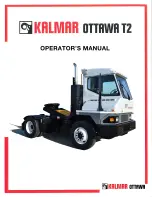
PART 7: STARTING & OPERATING THE VEHICLE
STOPPING THE ENGINE
(05/10)
Y53-6032
– 135 –
100°F (55°C) above the temperature reached during oper-
ation. A sudden rise in temperature like this could cause
the bearings to seize or the oil seals to loosen.
Refuel Before the Final Stop
Air space in your fuel tanks allows water to condense
there. To prevent this condensation while you are stopped,
fill your tanks to 95% of capacity.
WARNING!
Do not carry additional fuel con-
tainers in your vehicle. Fuel containers, either
full or empty, may leak, explode, and cause or
feed a fire. Do not carry extra fuel containers,
even empty ones are dangerous.
• Diesel fuel in the presence of an ignition
source (such as a cigarette) could cause an
explosion. You could be killed or seriously
injured. A mixture of gasoline or alcohol
with diesel fuel increases this risk of explo-
sion.
• Do not remove a fuel tank cap near an open
flame.
• Use only the fuel and/or additives recom-
mended for your engine.
Final Stop
To make sure your vehicle is ready to go after a long stop
(such as over night), please follow the suggestions below.
Your vehicle will be easier to get going when you are
ready, and it will be safer for anyone who might be around
it. Please remember, too, that in some states it is illegal to
leave the engine running and the vehicle unattended.
Final Stopping Procedures
1. Set the parking brake before leaving the driver’s seat.
To hold your vehicle while it is parked, don’t rely on
• Air Brakes
• Hand Control Valve for Trailer Brakes
• Engine Compression
WARNING! Using the trailer hand brake or air
brakes to hold a parked vehicle is dangerous.
Because they work with air pressure, these
brakes could come loose. Your vehicle could
roll, causing an accident involving death or
personal injury. Always set the parking
brakes.
Never rely on the trailer hand brake or
truck air brakes to hold a parked vehicle.
Y53-6032.book Page 135 Monday, May 24, 2010 3:37 PM
Содержание Peterbilt 587
Страница 1: ......





































